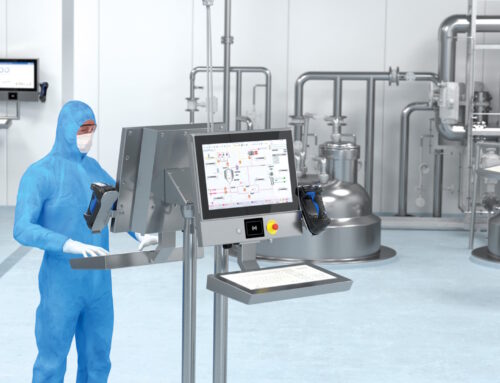September 18, 2017
People Make the Difference
Humans and robots in times of digitization and Internet of Things—how does tomorrow’s working world look like? Three experts from Pepperl+Fuchs discuss our future working world and the role that people will play in it.

Digitization, the Internet of Things, Industry 4.0—keywords that are pervasive and hotly debated. Again and again, the question arises of what this means for the workplace of the future. With Christian Schwöbel, Head of Global Technology Management and Production in Mannheim, Benedikt Rauscher, Head of Global IoT Projects, and Till Hoffmeyer-Zlotnik, New Business Development Sales Engineer, we have brought together three employees from different areas at Pepperl+Fuchs to exchange their views.
Christian SchwöbelFirst of all, it must be said that we already live in a digitized world. Think of video conferencing: That we are able to see colleagues in production facilities on the other side of the world on a screen, is only possible thanks to digital technology. In the same way, processes such as vacation requests take place electronically in companies today—this is also digitization. Such digitized workflows are also found in production. For example, there is increasingly the possibility to make status and process results available and able to be evaluated in digital form. For us in-house, this is actually already commonplace. So it is not the case that yesterday everything was analog and today it is digital. We only notice it more, simply because more and more is being digitized, and digital technologies are penetrating more and more areas.
Till Hoffmeyer-ZlotnikIn sales, this is shown by the simple example of how we communicate with customers today. In the past, a written request arrived by mail that was electronically recorded and edited by an employee, and then a written quotation was sent. Today the request itself is digitized and you do not need to be in direct contact with people, but rather with software. Continuing along this line, the person in such processes perhaps has at some point taken more of a supervisory function. Think of orders for large online retailers: From receipt to shipping, today all information and interactions run through software and systems—the process is not controlled by people. In future scenarios in the industry, one machine will place the order of your spare part directly with another machine.
Benedikt RauscherExactly, an important change in the industry is coming our way—provided that we are creating the technological basis for it. Today, we have a kind of “Internet of people”. This means that a person provides information on the Internet. In the “Internet of Things”, it is no longer the person that provides the information, but the machine itself—and for another machine. Naturally, this has an effect on the way we work.
Benedikt RauscherIndustry 4.0 uses the Internet of Things to make processes and workflows more efficient. Machines should be able to communicate with each other in a plant and even beyond the walls of a company. Processes such as ordering a spare part don´t then need to “detour” via a third point, which saves a lot of time. Such a message could be “I am almost finished with component A and am sending it to you for further processing.” This will speed up the processes because employees do not need to first record and enter a status and initiate or control further steps, but instead much more is automated.

Christian SchwöbelThe scenario of the human-free factory is raised again and again but has still not occurred, and I don't believe that it will. Of course the topic of digitization in production is also about automation. Steps and processes should be linked together so that machines work independently or communicate with each other, because people will most likely play a different role in the future. But this does not mean that people will no longer be needed. On the contrary: Tasks are, in my opinion, rather more complex. The cognitive abilities of us people will be essential in the future, because you must also be able to deal with the systems.
Benedikt RauscherThese skills cannot be replaced by a machine or a robot. But such developments may support people and streamline processes, meaning that the person can focus on other tasks. Let´s take sales as an example again. If machines regulated standard orders themselves, employees in sales would have time to handle more 'creative' things.
Till Hoffmeyer-ZlotnikThey will also need the extra time because digitization will lead to changes in customer requests and needs. While the customer previously looked at what the market had to offer and then requested a component such as a proximity switch, today, the customer comes to the company with a concern that they want to resolve without emphasis on a particular product. Industry 4.0 awakens the needs of customers, and sales receives the bouquet of needs. Experts who can deal with such requirements and develop solutions specifically for these needs are imperative in companies.
Till Hoffmeyer-ZlotnikAbsolutely. Today, we work in fixed structures. With requests for solutions and products that are tailored to the needs of our customers, this is likely to increasingly change to working in and on projects—across company divisions. As indiÂvidual as the customers´ wishes in the context of the digital transformation are, the sales approaches must be equally individual and unique. At the same time, this means that departmental boundaries are blurred. However, the introduction of new technologies such as virtual reality also has an influence on work. Field service employees will perhaps meet with customers in virtual space at any time instead of traveling to them—such future scenarios are also conceivable.

Christian SchwöbelWe can assume that various areas will become even more intermeshed in the future. Sales, product management, development, and, last but not least, production will be enhanced in the future and work more closely together. If you accept that the products and solutions will be increasingly customized and even individually produced, you will see that it is just not possible any other way. Areas may also come together that previously had never come into contact.
Benedikt RauscherIn my opinion, communication and teamwork will therefore have much greater significance in the future. Because as much as we digitize, we will still need to talk and work with each other—and even more so than ever. Individual business units or even different companies must come together, using their combined expertise to create a solution, particularly with complex projects. Social skills therefore gain importance in the process of digitization rather than becoming less important, as some might assume.
Benedikt RauscherUndoubtedly, more flexibility will be required of us in the future, with regard to what the tasks are and the way we work. We need to be open to new things. 'Lifelong learning' is a good keyword here, because it will probably not be the case that you can perform the same task for your whole career. Job tasks are also changing alongside technological advances.
Christian SchwöbelBut one thing is certain: People are and remain important, and are in fact more important than ever. Because after all, it is people that address, implement, and then maintain developments such as those needed for Industry 4.0 scenarios. It should also be borne in mind that a complex development lies behind all of the simplicity that so much technology offers. Right now, we can only speculate about the jobs of tomorrow.
Till Hoffmeyer-ZlotnikDigitization can also create more flexibility for the individual, when, for example, it is no longer necessary to be on site, because the work can be accomplished from anywhere via the Internet. However, the existing rules in the company must be reconsidered for this, starting with the workspace and concluding with the time model. So digitization not only affects production and sales, but the whole company.
Benedikt RauscherDigitization is actually also a change process. It is not just about developing digital technologies. Learning to deal with more and more digital technology and using it to our advantage is ultimately the big change facing us all.






